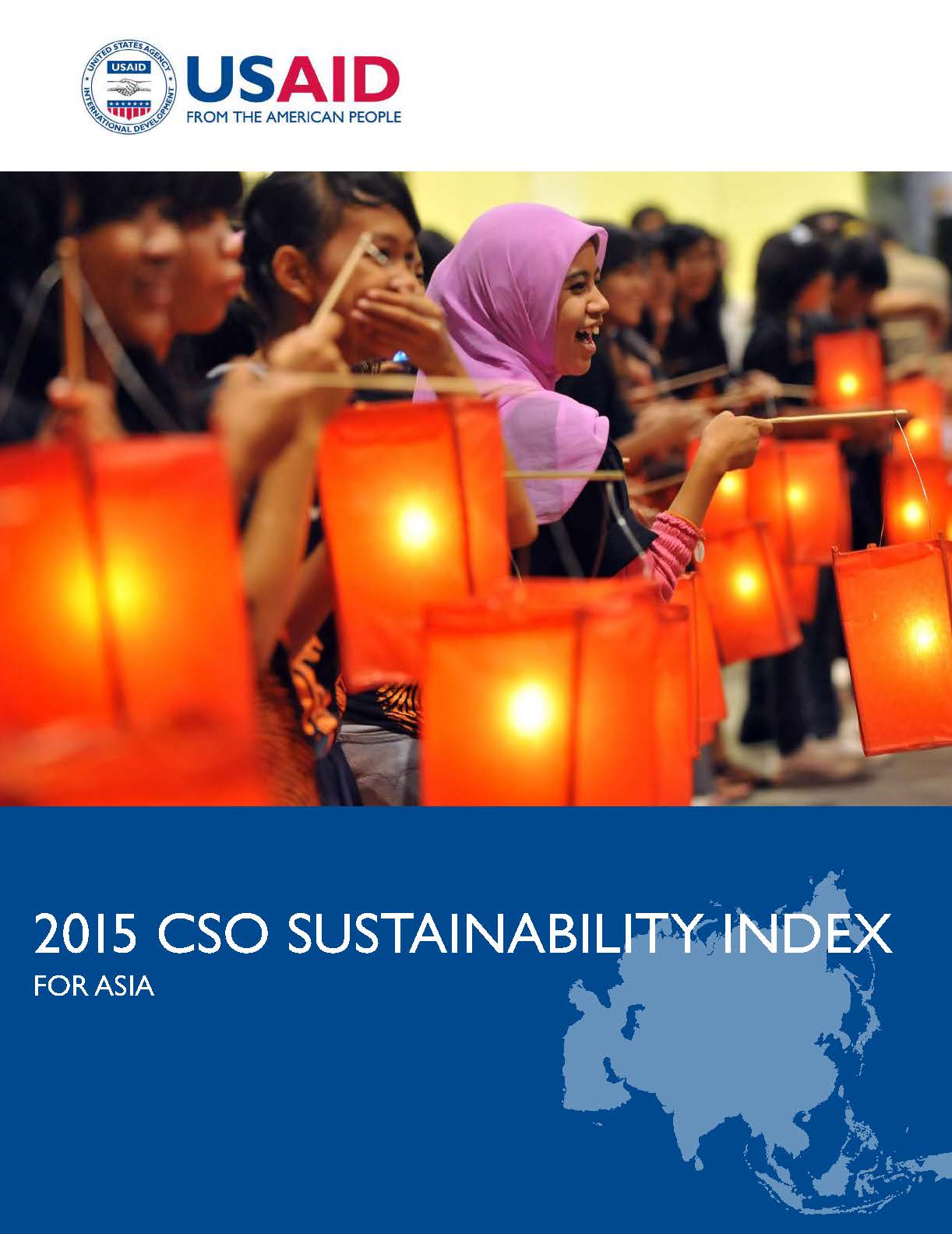- What We Do
- Agriculture and Food Security
- Democracy, Human Rights and Governance
- Democracy, Human Rights and Governance Strategy
- Supporting Free and Fair Elections
- Supporting Vibrant Civil Society & Independent Media
- Protecting Human Rights
- Promoting Accountability & Transparency
- Importance of Democracy, Human Rights, & Governance to Development
- Countering Trafficking in Persons
- Economic Growth and Trade
- Education
- Ending Extreme Poverty
- Environment and Global Climate Change
- Gender Equality and Women's Empowerment
- Global Health
- Water and Sanitation
- Working in Crises and Conflict
- U.S. Global Development Lab
BACKGROUND
The 2015 CSO Sustainability Index For Asia ![]() (pdf - 1 MB)
(pdf - 1 MB)
The Civil Society Organization Sustainability Index (CSOSI) has been used by USAID since 1997 to assess the sustainability of the CSO sector in 29 countries in Europe and Eurasia. The CSOSI was first applied in sub-Saharan Africa in 2009. In 2011, the CSOSI tool was further applied to seven countries in the Middle East as well as Afghanistan and Pakistan. The Aga Khan Foundation funds CSOSI in the latter two countries as well as in two countries in sub-Saharan Africa. The CSOSI is used by CSO advocates, other development partners, and academics to assess international and regional trends in the civil society sector and to identify common obstacles impeding the sector’s sustainability, such as the legal environment, organizational capacity, and financial viability, as well as to track areas where sustainability has improved.
APPROACH
The CSOSI measures the sustainability of each country’s CSO sector based on the CSOSI’s seven dimensions: legal environment, organizational capacity, financial viability, advocacy, service provision, infrastructure, and public image. The CSOSI’s implementing partners in each country lead the process of organizing and convening a diverse and representative panel of CSO experts. Country panels discuss the seven dimensions for the year being assessed and reach consensus on the scores corresponding to each dimension. The scores are organized into three basic categories representing the level of development of the civil society sector: Sustainability Impeded; Sustainability Evolving; and Sustainability Enhanced. All scores and narratives are then reviewed by a Washington-based editorial committee, assisted by regional civil society experts.
FINDINGS
Whether responding to devastating earthquakes in Nepal, facilitating national reconciliation in Sri Lanka, or advocating against a restrictive new law governing the sector in Cambodia, CSOs in the seven countries covered by this second edition of the CSOSI for Asia all played critical roles in local and national development during 2015. While overall sustainability levels for all of the assessed countries fall within the Sustainability Evolving category, this fact masks the great variations across the countries in overall sustainability and within the different dimensions. For instance, Thailand had the weakest overall sustainability in 2015, followed closely by Sri Lanka. Thailand remains under the rule of a military government, which continues to use the constitution and laws to suppress the freedom of expression and arrest dissidents. While Sri Lanka, which had the lowest overall sustainability in 2014, reported remarkable improvements in CSO sustainability in 2015 due to a dramatic opening of civic space in the country after the election of a new president and a new coalition government during the year. CSOs in several of the assessed countries, including Bangladesh, Thailand, and Sri Lanka, made significant strides in working with government and conducting broad-based advocacy and lobbying during the year. Nonetheless, CSOs in several of the assessed countries reported continued lack of genuine government-CSO cooperation. CSOs in all of the assessed countries provide a diverse range of services, from basic public services in areas such as health and education, to more complex services in the areas of environmental protection and human rights. Many of these services rely on foreign funding, and declines in funding can interrupt or stop services. The size of the CSO sectors vary greatly, both depending on the size of the country as well as the ease of registration. Nepal and the Philippines report the largest sectors: estimates place the number of active CSOs in Nepal at over 300,000 while data in the Philippines indicates the existence of 261,762 registered CSOs as of 2014. Sri Lanka reports the smallest number of registered CSOs in 2015 (1,496).








Comment
Make a general inquiry or suggest an improvement.